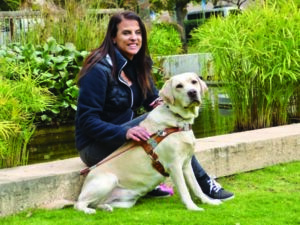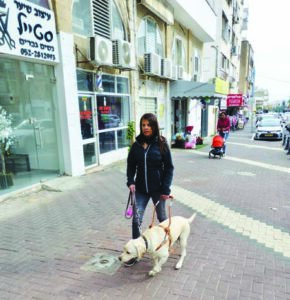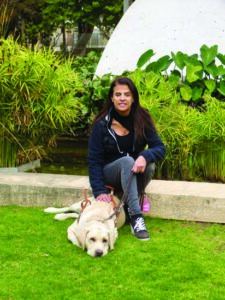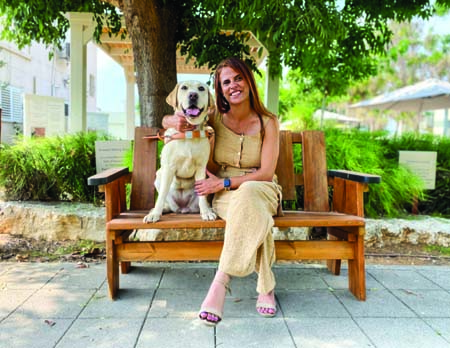By Ephraim Seidman
Your cell phone alarms you that you are in imminent danger, and you need to seek shelter immediately. You run to a bomb shelter just in time to hear the explosions of Iron Dome taking out Hamas rockets. You are safe.
Now, imagine having to do all that … and you are blind.
Welcome to the world of the blind in Israel. Such is the life of Sharon Ashtar with Israel being at war since Oct. 7, as explained to me on my recent stay in Israel. The war has been very hard. This is one of the few times she said that having a Guide Dog might not be too helpful – you have to rely on strangers to get you to safety.
Sharon lost her eyesight gradually due to Retinitis pigmentosa (RP), a genetic condition, and is now almost completely blind.
She lives in our Partnership2Gether (P2G) sister city Hadera, which is part of our Southeast Consortium U.S. Hadera is a coastal city of some 100,000 that fortunately has not had a lot of rocket attacks.
I met and talked with Sharon several times during my stay. Her Guide Dog, Yasha, (who she likes to call Yashi) has allowed her to regain her sense of independence and confidence; allowing her to successfully travel on her own. Sharon received Yashi from the Israel Guide Dog Center for the Blind about ~1.5 years ago. She said for her, Yashi is a “life changer.”
Walking with a cane was frustrating for Sharon. She has to walk very slowly. She explained until you experience walking with a Guide Dog, you don’t know how life-changing it can be.

“Everyone told me, ‘Wait until you have a Guide Dog, then you’ll understand the difference.’ They were right. I have no regrets. I feel I can move forward in my life now.”
“Yashi gives me support to go wherever I want. I am so proud of her, and what I’ve been able to do, and where I’ve been able to go because of her. I didn’t think that I would connect with Yashi so strongly or fall in love. It’s a different kind of connection between her soul and my soul. She loves me. She is more than my eyes. “Yashi is my soulmate.”
Sharon is the mother of a 22-year old son and an 18-year old daughter. Her son serves in the IDF, and communications with him are sparse. She presumes he’s in Gaza fighting for all of Israel. Like so many Israeli parents, Sharon worries but says “this is how we have to live in Israel. We have to do whatever we need to do to support our country. It was his time.”
Being blind has compounded the impact of the war on Sharon. When she hears a siren or alert of an incoming rocket, she calls “ali” (come) and Yashi runs to her in the safe room in her apartment. These days, in addition to being her Guide Dog, Yashi has also become her emotional support dog.

Sharon noted that due to the war, she is scared to go outside. If there is a rocket attack, she doesn’t want to have to rely on others. So, she just doesn’t go out much anymore and that has limited her activities.
Under “normal” circumstances, Sharon is a very, very active woman. She rides tandem bikes with her local CanVelo Tandem Biking Group. Sharon is a salsa dancer and loves music of all types. She also takes trips all over Israel with both sighted and unsighted groups.
And since 2008, Sharon has been on the National Lawn Bowling Team where she developed into a world-class player – winning two Gold medals!
At the 2023 International Blind Bowls Association World Championships earlier this year in Australia, Sharon and teammate, Itzik Baranes won the Gold Medal over South Africa in mixed pairs. She then went on to win a Silver Medal in women’s singles over her South African opponent.
Being on the medal stand was not new to Sharon. In 2015, she won the Gold Medal in women’s singles at the International Bowls for the Disabled’s international competition in New Zealand.
She shared with me that standing on the podium during the medals ceremony, as a person who is blind, and with Hatika being played, she simply did not have the words to explain what that means. She said it was for Israel, not for her. Bravo Sharon!
She studied Mechanical Engineering in college before going into the IDF where she provided supplemental support for a commando unit in the Navy. This is work she loved. It was very meaningful, she added.
Professionally, today she works two jobs – at Negishut (Access) Israel where she lectures on blindness and Guide Dogs, and Aleh, a non-profit that supports the blind and students with disabilities. In addition, she also helps at a local hospital to support people who are going through operations connected with vision loss.
But the war has changed much of that. Now, she has to do a lot of remote work that is very difficult as people on video calls are often on mute. And, of course, Sharon cannot see who is online.
Stories of Israelis finding ways to cope in this war are inspiring. For me, spending so much time with Sharon showed me how complicated this war is for real Israelis. Despite her hardships, Sharon is an eternal optimist. Her optimism is inspirational and reinforces the idea that the idea that klal israel is more important than ever.
Sharon and Yashi’s story is only one. The Israel Guide Dog Center has hundreds of stories of their dogs changing the lives of people who are blind, veterans with PTSD, and children on the autism spectrum.

In early April, our friends from the Israel Guide Dog Center will be visiting Richmond. Stay tuned for more details.
**************************************************
Retinitis pigmentosa – https://www.nei.nih.gov/learn-about-eye-health/eye-conditions-and-diseases/retinitis-pigmentosa
Partnership2Gether Consortium – https://www.facebook.com/P2GHaderaEironSE
Israel Guide Dog Center for the Blind – https://www.israelguidedog.org/
CanVelo Tandem Biking Group – https://www.israelguidedog.org.il/en/canvelo-tandem-bike-group/
Access Israel – https://www.aisrael.org/?CategoryID=2110&ArticleID=49527
Aleh – https://aleh.org/en/aleh/





